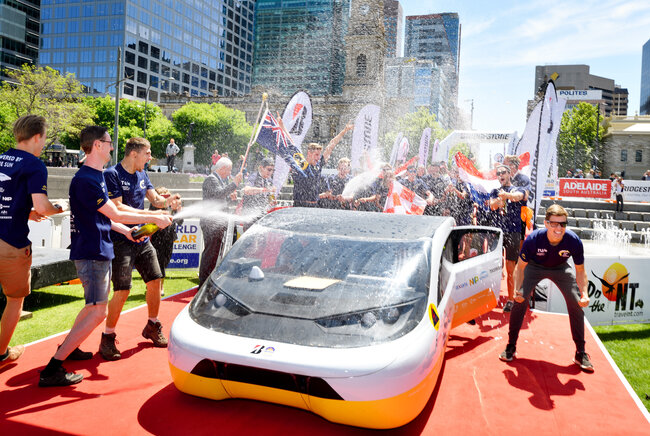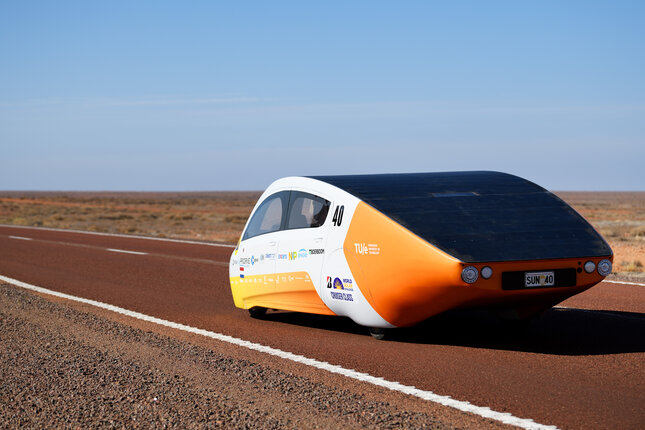Solar car TU/e wins gold at the World Solar Challenge, for the fourth time in a row

Solar Team Eindhoven, the team of Eindhoven University of Technology, has taken top honors in the Cruiser Class of the Bridgestone World Solar Challenge (WSC) for the fourth time in a row. The team completed the more than three thousand kilometer long stage from Darwin to Adelaide with the highest efficiency score of all teams. Also in the assessment of the solar cars by the professional jury, yesterday, the team outscored its rivals by far. Solar Team Eindhoven has won all editions of the Cruiser Class of the WSC so far.
The Cruiser Class was introduced in 2013 because the well-known World Solar Challenge was too far removed from normal car use. The new class was intended to close that gap, so that the results of the World Solar Challenge really find their way into practice. In the Cruiser Class, it's not necessarily the fastest car that wins, but the one that excels in efficiency, comfort, design and innovation.

Highest score for efficiency and innovation
The students of Eindhoven University of Technology achieved a total score of 204.8, of which 111.7 points were for efficiency and 93.1 for comfort and innovations. After the team crossed the finish line last Friday at 11.30 am (local time), it presented the practical benefit, comfort and technical innovations to a jury consisting of engineers from Tesla, among others. This part is particularly important because it counts as much as the efficiency score achieved during the race.
With unique features such as autonomous searching for the sun and the sharing of solar energy with other electric cars, appreciation was high for the Eindhoven team with its four-seater solar car, Stella Era.
Challenges
Given some significant setbacks for the team, the students were even happier than they might have been – like the arrival of the solar car Stella Era in Darwin with a damaged solar panel and the problems the team had with the electrical system two weeks before the start, the cause of which was initially unknown. Carijn Mulder, team manager: "Due to the setbacks in the preparation, we missed a lot of test days, so we weren't sure of what to expect during the Challenge."
In addition, the strong headwind on the longest stage of 1200 kilometers was a big challenge. The team had to cover that distance on one battery charge. Solar Team Eindhoven was one of the two teams that finished this stage on time, which meant that it incurred no penalty time.
Fourth victory
In her victory speech at the ceremony, Mulder spoke with pride about the challenges that the team had overcome. "It was certainly not self-evident that we would become world champions for the fourth time. All the challenges kept the team sharp during the preparations and the competition until the last moment. We are all very proud of our high scores and victory."
The students drove at an average speed of 70.2 km/h and charged only an additional 71.24 kWh via charging stations over the entire distance. By way of comparison, an ordinary electric car, with no solar panels, has to charge about ten times as much energy.
The car as charging station
The Eindhoven team also won the Smart Grid Pitch Competition. This prize is awarded for the idea that best contributes to a sustainable electricity supply. Stella Era can also serve as a 'charging station'; other cars can utilise the excess electricity that is generated.
Spin-off
Solar Team Eindhoven has already led to a major spin-off: the company Lightyear, which builds electric cars with integrated solar panels. This company from Helmond, which already has about 150 employees, presented its first car earlier this year.
Video footage of the race and the award ceremony are available here.